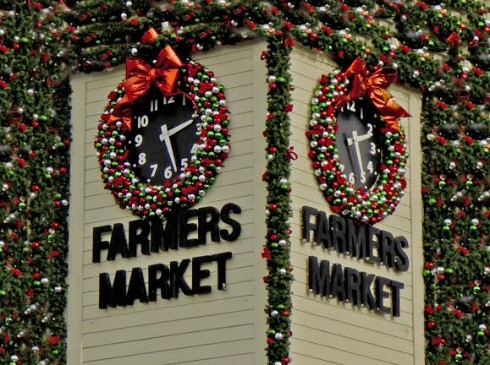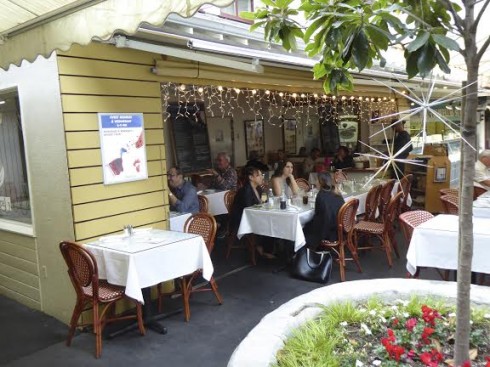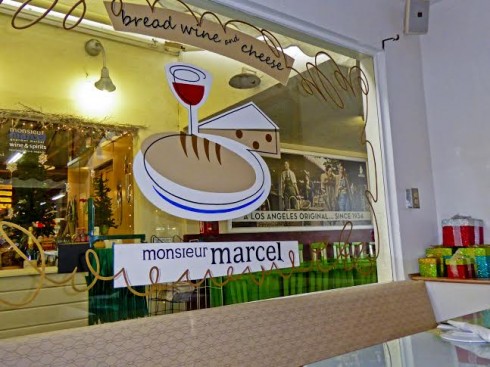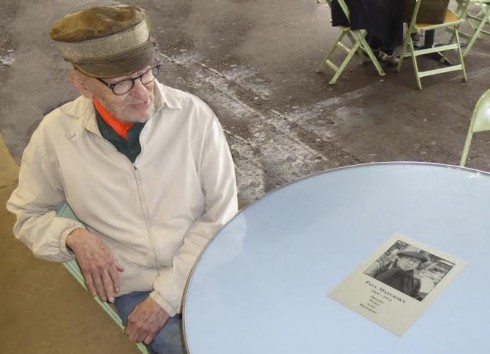Farmers Market Trip Becomes Sentimental Journey
By Bob Vickrey
Maybe our moods were altered somewhat by the cold, gray December day we had chosen to visit the historic Farmers Market on Fairfax Avenue, or perhaps it was simply the memories of trips there in our younger days that triggered a nostalgic feeling among us, as we walked the aisles of one of the great Los Angeles institutions.
Our monthly lunch club get-together took on a different tone than some of the earlier trips in the past year. The conversation was more reflective that day as we each shared stories about our early memories of time spent in the old market that had always best symbolized the cultural melting pot that is Los Angeles.
Arnie Wishnick grew up in Oak Park, Illinois, but as a teenager, he visited his relatives in L.A. during summer vacations, and was routinely taken to the Farmers Market. He vividly remembers the printing shop that would print the headline of your choice on an official-looking newspaper. He remembers choosing one that read: “ARNIE INVADES L.A.!” After his family eventually moved to Los Angeles, his dad retired from the grocery business, but after quickly becoming bored with retirement, he took a job in the produce section at the Market, and worked there happily until he died in 1981.
Barry Stein is the only member of our group who grew up in Los Angeles, and is also the only one of us who still makes frequent trips to the Market. As a young boy, he remembers receiving elegant hand-painted toy soldiers each Christmas from his Uncle Carl that were bought at Kip’s Toyland (which is still in business there today.)
On the way there, we made a command decision that we should choose one eating establishment, instead of fanning out and foraging for lunch at our favorite food stands, and thus risking possibly never finding one another again. In hindsight, it seemed like an inspired plan.
We chose the indoor/outdoor French restaurant, Monsieur Marcel, and immediately warmed to our rather candid waiter Gonzalo, who told us about the soup du jour, which was tomato basil, and then he added—“It’s not bad.” Arnie laughed and said, “With that ringing endorsement, I think I’ll have the French onion soup.”
We all ended up ordering sandwiches, which each included very generous portions of cheese—and one might even say—overly-generous portions of cheese. I may have actually made the prize selection this trip with my choice of the “Croque Monsieur,” with Swiss cheese, bacon, apple, and apricot dressing on a baguette. (I noticed the rest of the guys staring at my plate, which I attempted to shield from their view.)
Barry loves his Brussels sprouts, so once again, he ordered a side dish to share with the table—at least we assumed he ordered with that intention. We agreed their version came in a close second to the dish at the Chateau Marmont Hotel. (We vote on everything.)
As the lunch wound down, Barry roamed the market taking pictures, and Arnie set out on his search for the perfect donut. That interlude gave Josh Greenfeld and I a chance to reminisce about the world of publishing, where both of us had spent much of our adult lives—he as an author, and I as a publisher’s representative—which is secret code for salesman.
We remembered the great Sam Vaughn of Doubleday, who was his first editor, and known widely as one of the true gentlemen in New York publishing circles. Of course, I couldn’t mention anyone whom I’d met in publishing that didn’t bring a broad smile to Josh’s face. We shared stories about some of our favorite editors, including my friends Corliss (Cork) Smith and Jonathan Galassi, and one of Josh’s favorites—Richard Seaver. We realized that quartet of fine editors discovered, and published, some of the finest writers of the last half-century.
When Barry returned from his photo session, he led us to the upstairs dining area that featured a black-and-white photo exhibit of Farmers Market visitors, including the famous and not-so-famous. The subtle appeal of the modest exhibit was the simple concept of offering no identification of the subject in each picture. A famous movie star was placed next to one of the many uniformed workers at the market. There was acclaimed screenwriter Buck Henry’s picture alongside a young man who appeared to be a dishwasher at one of the food stands. That understated exhibit revealed the real magic and splendid history of the Farmers Market.
Barry then encouraged us to follow him to the outdoor area where he pointed out the customary table of Josh’s former writing partner, the late Paul Mazursky, who had held court there each day for many years.
The two had teamed up in writing the script for the 1974 film, “Harry and Tonto,” which earned them an Academy Award nomination (and an Oscar for actor Art Carney.) A picture of the screenwriter and actor had been laminated upon the center of the table with the inscription: “Paul Mazursky, 1930—2014, Director—Writer—Actor—Raconteur”
Josh Greenfeld sits at the table of his former writing partner, the late Paul Mazursky
Josh sat down slowly in his friend’s chair and smiled. He said, “Okay, now is when the nostalgia begins.” He took a deep breath and continued, “I first met Paul in Summer Stock in 1953…” and as his voice trailed off quickly, he sat quietly studying his old friend’s image.
Josh and I agreed that nostalgia could often easily lapse into melancholy, so it was safer entered into in the company of good friends. But on this particular day, as we concluded the first year of our lunch club, this sentimental journey we had all taken together, simply felt right—with no apologies offered.
Bob Vickrey writes for several Southwestern newspapers including the Houston Chronicle. He is a member of the Board of Contributors for the Waco Tribune-Herald and is a regular contributor for the Boryana Books website. He lives in Pacific Palisades, California.
Comments
Leave a Reply
You must be logged in to post a comment.







